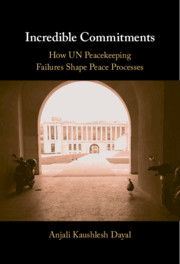Book contents
- Incredible Commitments
- Incredible Commitments
- Copyright page
- Contents
- Tables
- Acknowledgments
- 1 Introduction
- 2 The Social Context of International Peacekeeping and the Alternative Benefits of Bargaining
- 3 Methods and Case Selection
- 4 The Arusha Negotiations, 1990–1994
- 5 Guatemala, 1989–1996
- 6 Conclusion
- Bibliography
- Index
1 - Introduction
Published online by Cambridge University Press: 02 October 2021
- Incredible Commitments
- Incredible Commitments
- Copyright page
- Contents
- Tables
- Acknowledgments
- 1 Introduction
- 2 The Social Context of International Peacekeeping and the Alternative Benefits of Bargaining
- 3 Methods and Case Selection
- 4 The Arusha Negotiations, 1990–1994
- 5 Guatemala, 1989–1996
- 6 Conclusion
- Bibliography
- Index
Summary
The United Nation’s 1990s peacekeeping and peacemaking provoked introspection at the UN, but did not doom the UN’s peacekeeping or peacemaking enterprises. Why does UN peacekeeping remain a desirable part of peace processes despite its reputation as an ineffective measure of protection for civilian populations and warring parties alike? This book investigates why peacekeeping survived its early catastrophes and how this survival should lead us to reconsider how peacekeeping works. I advance two key claims: first, I argue the UN’s central role in peacemaking and peacekeeping worldwide means peace operations have structural consequences: what the UN does in one place can shift strategies, outcomes, and options available to parties to conflict in other places. Second, drawing peace processes in Rwanda and Guatemala, I argue combatants turn to the UN because its presence enables unique tactical, symbolic, and post-conflict reconstruction outcomes that have little to do with the end of fighting. Combatants who negotiate with the UN’s assistance after peacekeeping failures may do so because negotiation affords them benefits even when they are neither invested in peace nor convinced the UN can help them achieve it. The introduction outlines the problem, situates the answer, and summarizes each chapter of the book.
Keywords
Information
- Type
- Chapter
- Information
- Incredible CommitmentsHow UN Peacekeeping Failures Shape Peace Processes, pp. 1 - 11Publisher: Cambridge University PressPrint publication year: 2021
